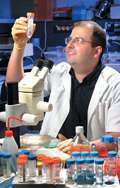Cardiac disease treatments could get help from patient-derived stem cells

Skin cells from a patient with an inherited heart disease were the seeds of a stem cell experiment that could help researchers test specific treatments for the disease, known as long QT syndrome. The research results appear in the January 16 issue of the journal Nature.
Scientists from the Technion-Israel Institute of Technology turned the skin cells into a type of all-purpose stem cell called induced pluripotent stem cells, or iPSCs. Prof. Lior Gepstein of the Faculty of Medicine and colleagues then coaxed these stem cells — which have the capability to become any cell type in the human body — to become cardiac cells. The newborn heart cells showed an abnormal electrical activity in the laboratory, recapitulating clinical presentation of the long QT syndrome patient, making them useful for studying this potentially lethal disorder.
The research team, which included Ilanit Itzhaki, Leonid Meizels, Irit Huber and colleagues, was then able to test several types of drugs to find out how they might aggravate or alleviate long QT symptoms in the cells.
The study can help scientists learn more about how a disease like long QT syndrome works at the cellular level, Gepstein said. But it also offers a glimpse at the future of personalized medicine, where a person’s own cells can be used to determine which treatments might work best—or should be avoided—for a particular condition.
Beyond its implications for personalized treatments, the Technion study offers a new way to study diseased cells that can’t be removed easily from the body, said Jeffrey Olgin, M.D., chief of cardiology and cardiac electrophysiology at the University of California San Francisco. “This has been challenging in heart disease since heart biopsies are difficult to obtain,” he explained.
Long QT syndrome is a disease that affects the heart’s ability to recharge itself after each heartbeat. In people with the disease, the heart’s electrical system takes longer than normal to recover between each beat. This disturbance can cause a fast, chaotic heartbeat that triggers fainting, seizures, and can result “in sudden death in otherwise healthy young individuals,” Gepstein said.
Some patients acquire the disorder after taking certain medications, but the disease is also caused by an array of inherited genetic defects that affect the proteins involved in recharging the heart. In the Nature study, Gepstein and colleagues used skin cells from a 28-year old woman with type-2 LQTS, which is caused by a single genetic mutation.
Long QT syndrome is a good disease to examine using iPSCs, said Gepstein, because it is caused by a mutation in a single gene, and there is a clear relationship between the mutation and how the cell behaves as a result. In this case, the individual cardiac cells derived from the stem cells demonstrated the same long recharging period and arrhythmia common in the hearts of long QT syndrome patients.
In the study, the disease “could be demonstrated and studied at the single-cell or multicellular level, but it doesn't require an entire organ, which of course we cannot create,” said Gepstein.
“This is something that in the past could only be done by developing mouse models or expressing a mutation in a non-cardiac cell,” Olgin agreed.
Gepstein said researchers around the world are also using iPSCs to study other heart diseases and nervous system disorders such as Parkinson’s Disease.
Finally, Gepstein commented that “the ability to generate heart cells from the same patients may be potentially used in the future also for additional fields such as for the emerging field of regenerative medicine, where they could be used in cell therapy and tissue-engineering strategies aiming to improve the function of failing hearts."















